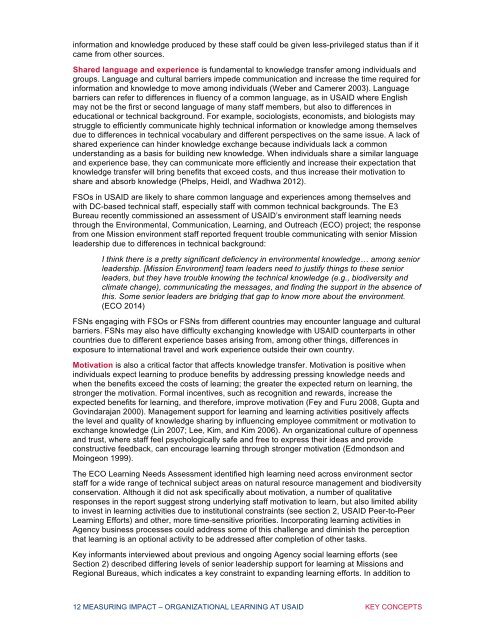MEASURING IMPACT Making Use of the Portfolio Organizational Learning at USAID
28Mzh2D
28Mzh2D
You also want an ePaper? Increase the reach of your titles
YUMPU automatically turns print PDFs into web optimized ePapers that Google loves.
inform<strong>at</strong>ion and knowledge produced by <strong>the</strong>se staff could be given less-privileged st<strong>at</strong>us than if it<br />
came from o<strong>the</strong>r sources.<br />
Shared language and experience is fundamental to knowledge transfer among individuals and<br />
groups. Language and cultural barriers impede communic<strong>at</strong>ion and increase <strong>the</strong> time required for<br />
inform<strong>at</strong>ion and knowledge to move among individuals (Weber and Camerer 2003). Language<br />
barriers can refer to differences in fluency <strong>of</strong> a common language, as in <strong>USAID</strong> where English<br />
may not be <strong>the</strong> first or second language <strong>of</strong> many staff members, but also to differences in<br />
educ<strong>at</strong>ional or technical background. For example, sociologists, economists, and biologists may<br />
struggle to efficiently communic<strong>at</strong>e highly technical inform<strong>at</strong>ion or knowledge among <strong>the</strong>mselves<br />
due to differences in technical vocabulary and different perspectives on <strong>the</strong> same issue. A lack <strong>of</strong><br />
shared experience can hinder knowledge exchange because individuals lack a common<br />
understanding as a basis for building new knowledge. When individuals share a similar language<br />
and experience base, <strong>the</strong>y can communic<strong>at</strong>e more efficiently and increase <strong>the</strong>ir expect<strong>at</strong>ion th<strong>at</strong><br />
knowledge transfer will bring benefits th<strong>at</strong> exceed costs, and thus increase <strong>the</strong>ir motiv<strong>at</strong>ion to<br />
share and absorb knowledge (Phelps, Heidl, and Wadhwa 2012).<br />
FSOs in <strong>USAID</strong> are likely to share common language and experiences among <strong>the</strong>mselves and<br />
with DC-based technical staff, especially staff with common technical backgrounds. The E3<br />
Bureau recently commissioned an assessment <strong>of</strong> <strong>USAID</strong>’s environment staff learning needs<br />
through <strong>the</strong> Environmental, Communic<strong>at</strong>ion, <strong>Learning</strong>, and Outreach (ECO) project; <strong>the</strong> response<br />
from one Mission environment staff reported frequent trouble communic<strong>at</strong>ing with senior Mission<br />
leadership due to differences in technical background:<br />
I think <strong>the</strong>re is a pretty significant deficiency in environmental knowledge… among senior<br />
leadership. [Mission Environment] team leaders need to justify things to <strong>the</strong>se senior<br />
leaders, but <strong>the</strong>y have trouble knowing <strong>the</strong> technical knowledge (e.g., biodiversity and<br />
clim<strong>at</strong>e change), communic<strong>at</strong>ing <strong>the</strong> messages, and finding <strong>the</strong> support in <strong>the</strong> absence <strong>of</strong><br />
this. Some senior leaders are bridging th<strong>at</strong> gap to know more about <strong>the</strong> environment.<br />
(ECO 2014)<br />
FSNs engaging with FSOs or FSNs from different countries may encounter language and cultural<br />
barriers. FSNs may also have difficulty exchanging knowledge with <strong>USAID</strong> counterparts in o<strong>the</strong>r<br />
countries due to different experience bases arising from, among o<strong>the</strong>r things, differences in<br />
exposure to intern<strong>at</strong>ional travel and work experience outside <strong>the</strong>ir own country.<br />
Motiv<strong>at</strong>ion is also a critical factor th<strong>at</strong> affects knowledge transfer. Motiv<strong>at</strong>ion is positive when<br />
individuals expect learning to produce benefits by addressing pressing knowledge needs and<br />
when <strong>the</strong> benefits exceed <strong>the</strong> costs <strong>of</strong> learning; <strong>the</strong> gre<strong>at</strong>er <strong>the</strong> expected return on learning, <strong>the</strong><br />
stronger <strong>the</strong> motiv<strong>at</strong>ion. Formal incentives, such as recognition and rewards, increase <strong>the</strong><br />
expected benefits for learning, and <strong>the</strong>refore, improve motiv<strong>at</strong>ion (Fey and Furu 2008, Gupta and<br />
Govindarajan 2000). Management support for learning and learning activities positively affects<br />
<strong>the</strong> level and quality <strong>of</strong> knowledge sharing by influencing employee commitment or motiv<strong>at</strong>ion to<br />
exchange knowledge (Lin 2007; Lee, Kim, and Kim 2006). An organiz<strong>at</strong>ional culture <strong>of</strong> openness<br />
and trust, where staff feel psychologically safe and free to express <strong>the</strong>ir ideas and provide<br />
constructive feedback, can encourage learning through stronger motiv<strong>at</strong>ion (Edmondson and<br />
Moingeon 1999).<br />
The ECO <strong>Learning</strong> Needs Assessment identified high learning need across environment sector<br />
staff for a wide range <strong>of</strong> technical subject areas on n<strong>at</strong>ural resource management and biodiversity<br />
conserv<strong>at</strong>ion. Although it did not ask specifically about motiv<strong>at</strong>ion, a number <strong>of</strong> qualit<strong>at</strong>ive<br />
responses in <strong>the</strong> report suggest strong underlying staff motiv<strong>at</strong>ion to learn, but also limited ability<br />
to invest in learning activities due to institutional constraints (see section 2, <strong>USAID</strong> Peer-to-Peer<br />
<strong>Learning</strong> Efforts) and o<strong>the</strong>r, more time-sensitive priorities. Incorpor<strong>at</strong>ing learning activities in<br />
Agency business processes could address some <strong>of</strong> this challenge and diminish <strong>the</strong> perception<br />
th<strong>at</strong> learning is an optional activity to be addressed after completion <strong>of</strong> o<strong>the</strong>r tasks.<br />
Key informants interviewed about previous and ongoing Agency social learning efforts (see<br />
Section 2) described differing levels <strong>of</strong> senior leadership support for learning <strong>at</strong> Missions and<br />
Regional Bureaus, which indic<strong>at</strong>es a key constraint to expanding learning efforts. In addition to<br />
12 <strong>MEASURING</strong> <strong>IMPACT</strong> – ORGANIZATIONAL LEARNING AT <strong>USAID</strong> KEY CONCEPTS


